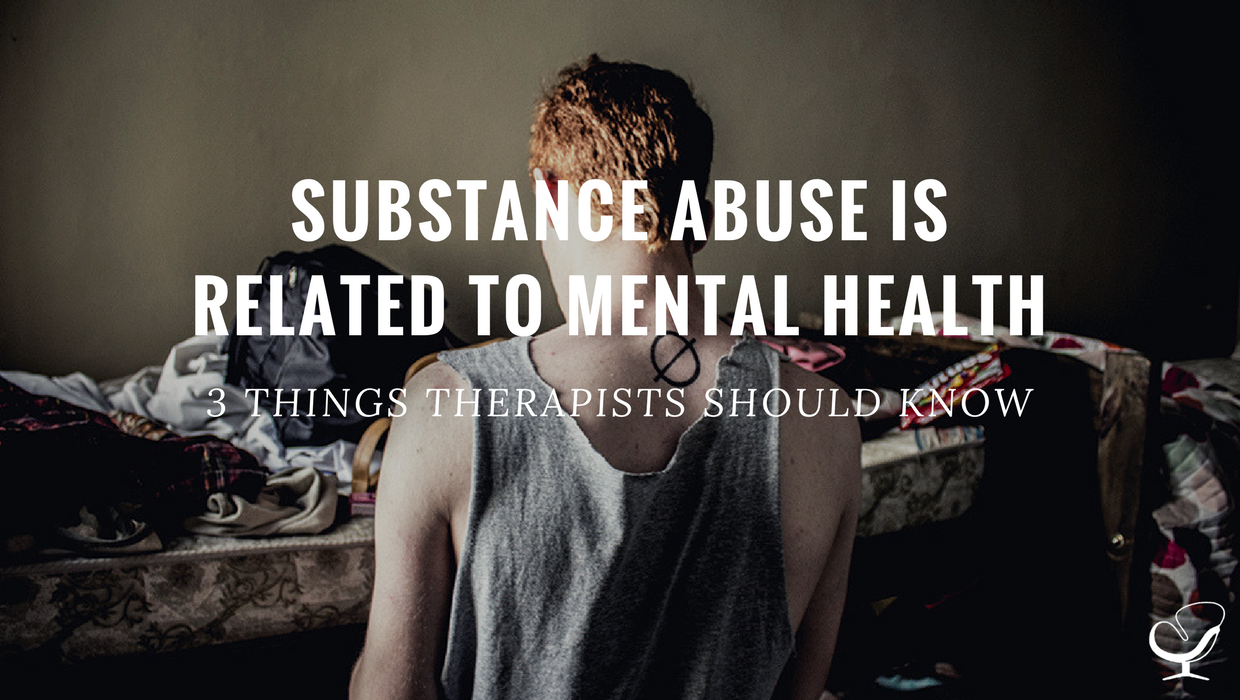I am going to make a really bold claim; substance abuse issues are mental health issues. What does this mean you might ask? Often, substance abuse issues are covering up really serious mental health issues, like anxiety, depression, trauma, as well as other serious struggles, like paranoia or hallucinations in some form. If there are not significant mental health needs being mitigated by the substance abuse, trauma can often form during the time frame a person uses substances. When someone is addicted and dependent on drugs or alcohol; they will often be in very scary and traumatic situations, be forced to do things they would not ordinarily do, or even engage in activities that are harmful just to obtain drugs or alcohol.
I believe most therapists already know this, but I am not sure if many know how pervasive substance abuse issues are with clients. Statistically, in 2013, about 10% of the population was addicted to some type of illicit substance. This comes from www.drugabuse.gov. This number has been steadily rising since 2002 and, given the opiate crisis, the number is probably greater than 10% now in 2017. Not all of these people seek treatment, but often they come into contact with other systems like the criminal justice or child welfare system. Given these numbers, and the fact that even the statistics don’t give a complete picture, therapists really need to be aware of substance abuse issues.
3 Things Therapists Should Do About Substance Abuse Issues
For these reasons, therapists need to do these three things about substance abuse issues:
1. Ask Questions
Therapists need to ask about substance abuse issues at intake and continue to ask and assess for this need. Often, people feel so shameful, powerless, or overwhelmed with their substance abuse, they will not seek help, or even let others know. The nature of addiction involves isolation and secrecy in order to continue with the addiction. Also, when people are physically dependent on drugs or alcohol, they need to continue to use to keep the withdrawal issues at bay. This can really take the idea of choice from their hands, so clients might not be honest at first, until things get bad or they develop enough trust in you. Clients also show small signs; maybe no-shows, maybe nodding out, or even being in constant crisis. It is important to be aware and ask questions.
2. Training
Therapists need constant training for substance abuse assessment and treatment. In the state of Michigan, social workers are required to have training hours for ethics, pain management, and now human trafficking in order to keep their licenses. As a therapist, substance abuse training should also be at the top of our list. If we look at the numbers, 1 in 10 of your clients could be using drugs or alcohol. If you are in private practice, and have 20-25 clients, that is 1-2 clients experiencing substance abuse issues.
Being at an agency, it could be even more considering case loads are often higher. So, if you have 30-40 clients, than that could be 4-5 people. These numbers could be even higher, because people seek help when their lives become really upsetting, miserable, or they receive pressure from family/friends to get help. The nature of substance abuse also involves having a negative life consequence, like jail or divorce.
3. Resources, Referrals, and Ideas
Therapists need to have good resources, referrals, and ideas to help clients with substance abuse issues. So, if you don’t want to work with people who have substance abuse issues, even though you probably already do, than have good referral sources. Substance abuse is not for the faint of heart! I can understand why you would not want to have it as your sole practice focus, but with the significant amount of people having substance abuse issues, please have a few therapists to refer to.
Also, learn about the local in-patient and intensive outpatient services in your area. Sometimes, we need to know when to refer to a higher level of care. Especially once we start assessing for substance abuse issues. It is also important to know about the support groups in the area (AA, NA, Smart Recovery, or Celebrate Recovery to name a few). Support groups can be a good supplement to treatment.
To Conclude
Overall, as a therapist, it is important to know as much as possible about substance abuse issues. Because, for some people, their addiction is life or death. This life or death risk is just as important to watch for as we do for our clients who have mental health issues, like depression or anxiety. The more you know about substance abuse issues, the better you are able to help your client. Even if it means a referral to another therapist, or a higher level of care. This desire to help is the reason many of us are in the field in the first place!
 Laurie Eldred is a licensed master of social work and certified drug and alcohol counselor in Lowell, MI. She is also the owner of Eldred’s Clinical Services. The goal of Eldred’s Clinical Services is to help teens and adults with transforming their lives from sobriety to recovery in a way that is empathetic, supportive and long lasting! Laurie has over 10 years experience in a variety of systems. These include community mental health, child protective services, the prison system, and inpatient substance abuse treatment. She can be reached through her website: www.ecstransforminglives.com, or through email at laurie@ecstransforminglives.
Laurie Eldred is a licensed master of social work and certified drug and alcohol counselor in Lowell, MI. She is also the owner of Eldred’s Clinical Services. The goal of Eldred’s Clinical Services is to help teens and adults with transforming their lives from sobriety to recovery in a way that is empathetic, supportive and long lasting! Laurie has over 10 years experience in a variety of systems. These include community mental health, child protective services, the prison system, and inpatient substance abuse treatment. She can be reached through her website: www.ecstransforminglives.com, or through email at laurie@ecstransforminglives.

